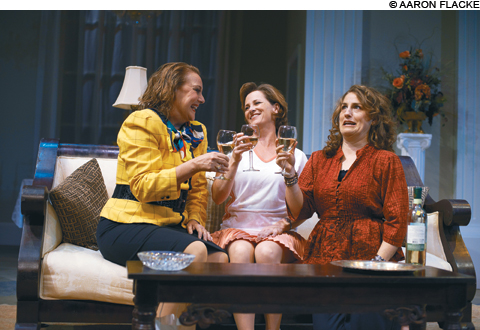
A VIRTUOSO TRIO The title characters of Portland Stage's The Sisters Rosensweig. |
Between the three of them, the sisters Rosensweig cover quite a range of the Meyers-Briggs psychological types: Sara (Amy McDonald), director of the Bank of Hong Kong and living a gentile atheist's life in London, is an introvert and a textbook "T" — a thinker — while her little sister Gorgeous (Carole Healey) is an emotionally out-there housewife, self-help radio personality, and observant Jew living in Newton, Massachusetts. The youngest, Pfeni (D'Arcy Dersham), a travel writer and reporter, is adventurous, intuitive, and open, but commitment-shy. When all three women come together under one roof, in the late Wendy Wasserstein's The Sisters Rosensweig, all manner of sororal fireworks are poised to go off, as they battle it out over men, careers, religion, and identity. Wasserstein's comedic drama receives a vibrant production at Portland Stage Company, under the direction of Chris Grabowski.
It's 1991, the USSR is crumbling, and the sisters are gathering to celebrate Sara's birthday at her opulent Queen Anne's Gate home, with lofty ceilings and windows, high pillars and fireplace of ivory molding, and luxurious dark wood furniture (rendered in Anita Stewart's typically gorgeous set design). Here, Sara will serve dinner for Pfeni, Gorgeous, Sara's Lithuanian Resistance-sympathizing daughter Tess (Megan Dorn), and a smattering of their men: Sara's upper-crust British lothario Nicholas (Ron Botting), Pfeni's world-renowned bisexual theater director Geoffrey (William Zielinski), and Sara's working-class punk revolutionary-of-Lithuanian-extraction Tom (Michael Dix Thomas). They're also joined by an unexpected interloper: Geoffrey's widowed, Jewish-American furrier Mervyn (John Plumpis), a good talker in a pink shirt and seersucker suit who, as soon as he meets the witty but restrained Sara, promptly insinuates himself into staying for cassoulet — and perhaps something more — in her beautiful home.
Each of the three actresses inhabits the space distinctly. McDonald's trim Sara, carefully tailored, perches primly on sofas, while Dersham's Pfeni, in loose and vaguely tribal clothing, sprawls and curls up on all available surfaces, and Healey's Gorgeous, buxom, brassy, and accessorized to the max, fairly bursts into every space she enters. These actresses convincingly convey the fraught dynamics of the sisters' affections, how just the right wrong word can send them all careening into old and new grievances about their so-different lifestyles. Scenes, suffice it to say, are made. Dersham's Pfeni, psychologically constellated somewhere in between the extremes of restrained Sara and the near-burlesque of Gorgeous, has the most realistic nuances of the three, but generally, these are characters written as modern comedic archetypes — bigger and more distilled than life — and so are the performances of these actresses very brightly amplified.
That brightness and hyperbole is also true of the supporting characters — Botting's stuffy aristocrat; Zielinski's sonorously flamboyant, Temptations-loving bisexual; and Thomas's chipper, mohawk-ed Cockney are broadly and colorfully drawn. Dorn's Tess wages a liberal elite's teenage rebellion — strident and self-righteous, but with self-awareness and familial respect never far from the surface. As the newcomer into the family chaos, Plumpis's Merv, though he's got a lot of stock schmoozing to deliver to skeptical Sara, has the most arc of the men on stage; he does an intelligent job of conveying a confident man's range of responses to Sara's hard instincts.